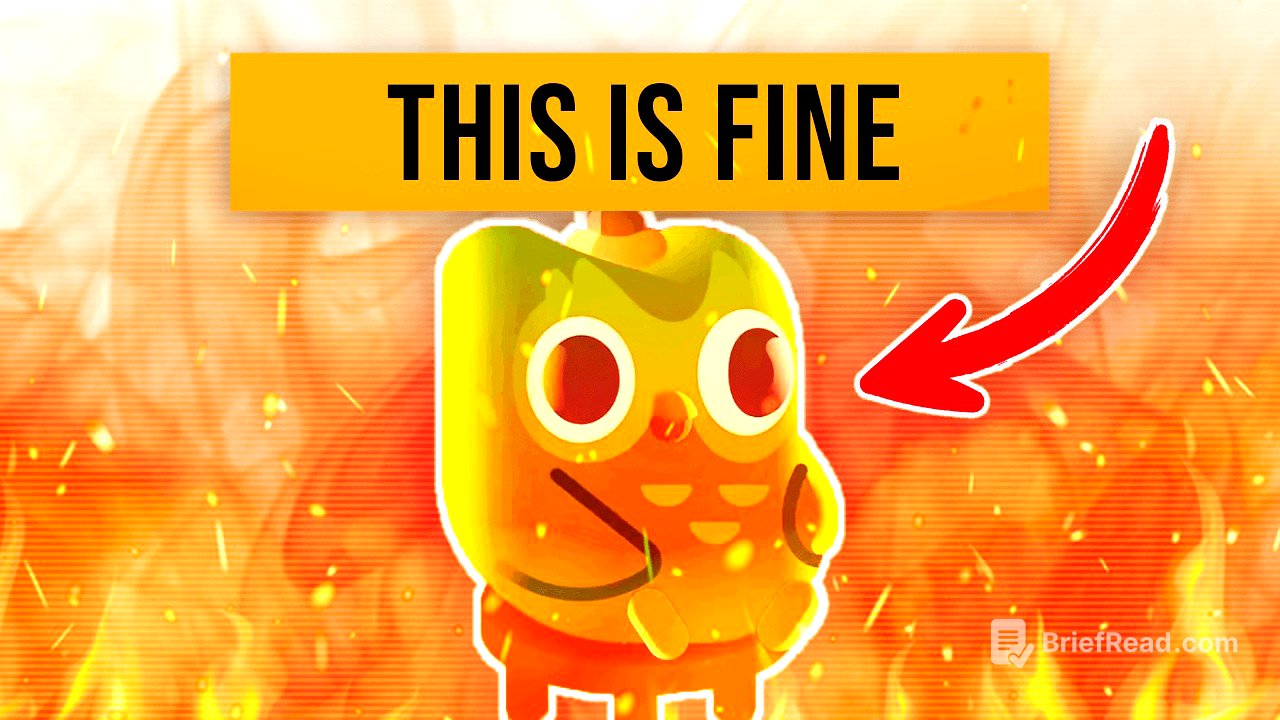TLDR;
This video discusses the perceived downfall of Duolingo, examining its shift from a beloved language learning app to a controversial company criticized for prioritizing AI and engagement over effective education. It explores Duolingo's history, business model, marketing strategies, and the impact of its AI-driven changes on user experience and learning quality. The video also touches on the company's financial success despite user criticism, questioning whether Duolingo is truly focused on education or simply on maximizing engagement and revenue.
- Duolingo's AI-driven changes have led to a decline in lesson quality and user satisfaction.
- The company's focus on gamification and engagement may overshadow its educational value.
- Despite criticism, Duolingo's stock is thriving, raising questions about its true business model.
The Brand, the Bird [0:42]
Duolingo's mascot, Duo the owl, has become a cultural icon, acting as a coach, troll, and reminder for users to continue their language learning. However, as Duolingo increasingly integrates AI and replaces human workers, the quality of lessons and features has declined, leading to user dissatisfaction. Many dedicated users feel betrayed by these changes, even to the point of abandoning their long-held streaks.
The Company [1:36]
Duolingo's founder, Luis von Ahn, previously created CAPTCHA and reCAPTCHA, tools that inadvertently trained AI using unpaid human labor. Duolingo's original business model involved translating documents for companies using its language learners as unpaid translators. While this model wasn't very successful, the company eventually introduced ads and subscriptions under investor pressure. They moved from Duolingo Plus to Super Duolingo and then Duolingo Max, which includes AI-powered features like "explain my answer" and role-play, for a higher monthly fee.
Memes to Growth [4:20]
Duo's recognizable mascot is a core part of Duolingo's acquisition and retention strategy. To combat slowing user growth in 2018, Duolingo brought Duo to life, turning him into a Clippy-like character who reminds users to do their lessons. The company also revamped its TikTok strategy in 2021, focusing on trendjacking and creating funny, edgy content. This strategy was successful, turning Duolingo into a household brand with millions of followers and high revenue.
AI Slop [6:36]
The introduction of Duolingo Max, with its AI tutors, marked a shift in the company's identity. Duolingo laid off 10% of its lesson-writing contractors, replacing them with AI-generated content. Users began to notice issues such as misgendered words, nonsensical sentence structure, and culturally insensitive responses. The company shut down its community forums in 2022, right before the AI roll-out. In February, Duolingo staged a bizarre stunt, announcing Duo the Owl's death to encourage users to engage with the app. Despite criticism, the company continued to embrace AI, with the CEO declaring Duolingo an "AI-first company".
Learning Feelings [9:32]
Duolingo is designed to make you feel like you're learning a language, but it may not actually teach you one. While you'll learn some vocab and memorize some phrases, you likely won't be able to have a real conversation in that language. The app is more like a game than a classroom, with XP, leaderboards, and streaks. Duolingo's biggest flaw might be that it confuses memorization with communication, failing to teach context, cultural nuance, or how to think in another language.
The Numbers [12:40]
Despite criticism, Duolingo's stock is currently trading at all-time highs, and the company is worth seven times what it was worth just two years prior. Daily active users grew 50% year-over-year, paid subscriptions are up 40%, and revenue is also up 40%. Despite talking about saving money with AI, Duolingo is actually spending more money this year than it did last year on expenses.
Is the Hate Real? [12:35]
Despite the company's financial success, the lessons are wrong and the platform isn't designed to actually help you learn, is it really education? Duolingo isn't in the business of education, it's in the business of engagement. It only matters that you think you're learning long enough to watch an ad or buy a subscription. The more they chase this model, the further they drift from their original mission to make the best education accessible to all.









